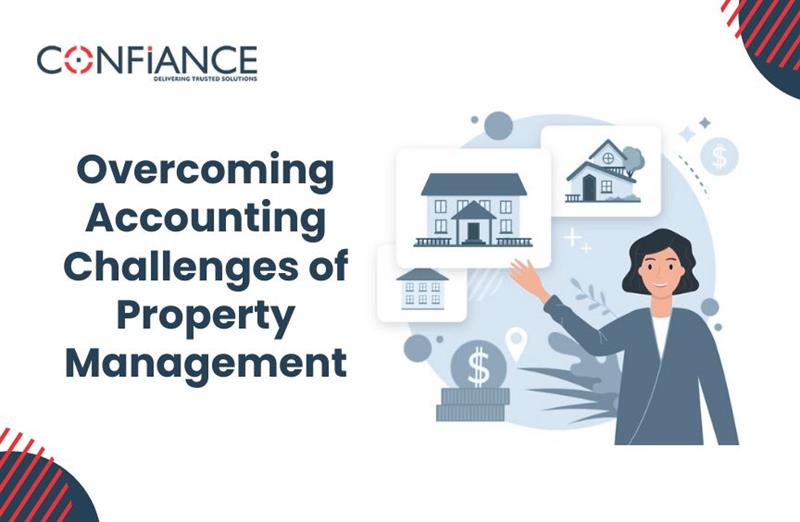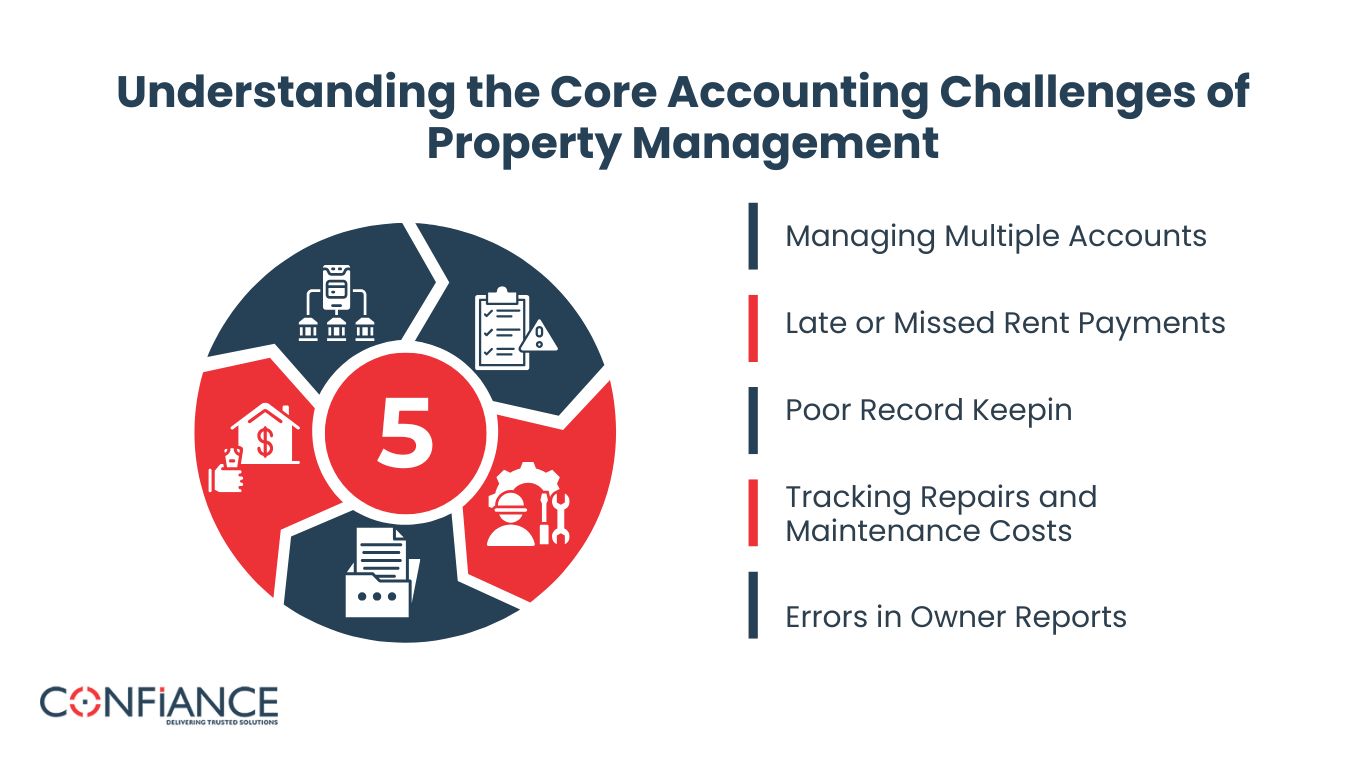
Overcoming Accounting Challenges of Property Management
Managing property comes with more than tenant requests and maintenance calls. For a property management company, accounting plays a big part in keeping things on track. Accounting plays a big part in keeping things on track. From rent collection to vendor payments, every transaction must be clear and accurate. Still, many property managers struggle with financial processes. In this blog, we’ll have a look at some common accounting challenges of property management and how to fix them.

Understanding the Core Accounting Challenges of Property Management
Challenges in property management show up more often than others. These issues cost time and sometimes money if left unchecked.
1. Managing Multiple Accounts
Many property managers handle several rental properties, each with its own bank account, vendors, and tenants. Each one may have its own bank account, vendors, and tenants. Tracking income and costs across all of them can be messy and extremely time consuming without a good system. Proper trust accounting practices help separate client funds, protect owner money, and reduce reporting errors. Mistakes here affect taxes, reports, financial statements, and daily decisions.
Example: A manager handling 15 units across 4 properties found discrepancies in expense tracking due to one vendor being paid from the wrong account. Software flagged the error before it affected reporting.
2. Late or Missed Rent Payments
Cash flow depends on rent coming in on time. But tenants miss payments, or records get lost. Without alerts or automatic tracking, managers may not catch problems until it’s too late.
Interesting fact: According to a 2023 Rentec Direct survey, 35% of small landlords reported cash flow issues due to inconsistent rent payments
3. Poor Record Keeping
It’s easy to skip documentation during busy days. However, receipts, bills, lease agreements, and repairs must all be logged as part of your financial records. If records are missing or disorganized, audits and tax season become stressful.
4. Tracking Repairs and Maintenance Costs
Some costs blend into others. If you can’t see how much each property costs to maintain, it’s hard to manage budgets or plan for big repairs.
5. Errors in Owner Reports
Property managers must send reports to owners. If numbers are wrong or unclear, trust breaks down. These errors may also lead to legal issues or delays in payments.
How to Solve the Accounting Challenges of Property Management
You don’t need to overhaul everything at once while dealing with the challenges. A few smart changes can fix most issues.
1. Use Property Management Accounting Software
Good software helps track every dollar. Choose tools made for property management. These platforms can:
- Handle multiple accounts and properties
- Track income and expenses in real-time
- Send automated rent reminders
- Store and sort records for easy access
- Create reports with clear data
- Tools like Buildium, AppFolio, and Rentec Direct are built with these needs in mind.
2. Create a Standard Chart of Accounts
A chart of accounts is a list of all financial accounts used in a company’s books. It helps you stay organized and group similar transactions. For property management, a chart of accounts should cover:
- Rent income
- Maintenance expenses
- Utilities
- Property taxes
- Owner disbursements
- Using a standard setup means fewer errors and faster reporting.
3. Set a Monthly Closing Routine
Waiting until the end of the year to fix your books is risky. Instead, close your books every month. Reconcile bank accounts, check reports, and fix issues early. This makes year-end reporting easier and keeps your finances accurate.
4. Automate Rent Collection
Use online portals to collect rent. Many tenants prefer paying online. This also:
- Cuts down on late payments
- Adds clear records to your books
- Sends automatic reminders
- Online rent collection is better and safer as compared to cash or checks, while also streamlining operations for both managers and tenants. Additionally, it is also easier to track.
5. Track Repairs by Property and Unit
Use your software to link each repair to a specific rental property or unit. This gives you a better view of where the money goes. Over time, it helps you plan upgrades, control costs, and show owners how their property is doing.
6. Improve Owner Communication
Send regular, clear reports to owners. Include:
- Rent collected
- Costs paid
- Net income
- Notes on repairs or tenant changes
- A good report builds trust and cuts down on back-and-forth calls or emails.
Common Mistakes Property Managers Make With Accounting
Avoiding common errors can save hours of work and prevent financial problems.
1. Mixing Personal and Business Finances
Even if you manage just a few properties, keep business accounts separate. Mixing funds can cause tax issues and make it hard to see the true performance of your property management work.
2. Not Backing Up Data
Digital tools are great, but they fail sometimes. Back up your records regularly. Use cloud storage, but keep local copies too. Losing financial data can mean lost income and serious legal trouble.
3. Forgetting to Track Security Deposits
Security deposits are not income. They’re kept in a separate account and need to be tracked on their own. Not doing so can lead to legal trouble, especially if the tenant claims it was not returned in full.
4. Poor Training on Software
Tools only help if your team knows how to use them. Set time aside for training. Make sure everyone follows the same process for entering data and handling payments.
Tips for Staying Ahead of Accounting Issues
Prevention is better than cleanup. A few habits make a big difference.
1. Review Reports Regularly
Don’t wait for tax time. Check reports every month. Look for patterns, gaps, or numbers that seem off. Fixing small issues early keeps them from turning into bigger ones.
2. Work With a CPA Who Knows Property Management
Find an accountant or tax pro who understands this field. They’ll help you avoid mistakes, claim deductions, and follow rules specific to property income.
3. Update Lease Agreements to Reflect Fees and Charges
Late fees, pet fees, and maintenance charges must be in the lease. This helps maintain a steady income and ensures accurate records.
4. Keep Your Software Updated
Outdated software can slow things down or cause key updates to miss. Set reminders to install new versions. If your platform is no longer supported, switch to one that is.
How to overcome Accounting challenges in Property Management?
Keeping your books clear can improve results. Here’s how:
- Better budgeting: You see where the money goes and plan better.
- Stronger owner trust: Accurate reports show you’re managing their property well.
- Faster decisions: With up-to-date numbers, you can act without delay.
- Easier audits and taxes: No need to scramble for records at year-end.
Quick Fixes to Common Property Accounting Issues
| Problem | Smart Fix |
| Tracking multiple accounts | Use software with multi-property support |
| Late rent payments | Set up online rent collection |
| Poor record keeping | Store receipts and lease files digitally |
| Missed maintenance costs | Tag repairs by unit in your system |
| Owner report errors | Set a standard reporting format |
With innovative systems, smart tools, and good practices, property managers can stay in control of their finances. Focus on keeping records clean, automating key tasks, and reviewing your data often. These small steps make a big difference over time. Contact Confiance now if you need help dealing with your property management bookkeeping. Our years of experience and expertise can help you overcome the accounting challenges of property management.
FAQs
What are the most common accounting challenges of property management?
The most common challenges include tracking multiple property accounts, handling late rent, poor record keeping, missed maintenance costs, and errors in owner reports.
How can I stay organized when managing several properties?
Use property management software that tracks income, expenses, and tenant details for each property. Keep separate bank accounts and use a standard chart of accounts.
Should I hire an accountant for my property management business?
Yes, especially one familiar with property management. They can help with taxes, reports, and avoid common financial mistakes.
How do I handle security deposits in accounting?
Treat security deposits as a liability, not income. Track them separately and refund them as required by local laws.
What’s the best way to reduce late rent payments?
Use online rent collection with automatic reminders. It keeps payments on time and records accurate.
